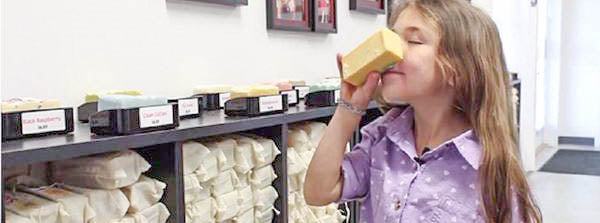One question I am regularly asked is, "How strongly are your soaps scented?" This is such a difficult question to answer because everyone's sense of smell is unique. I can give the exact same bar of soap to 3 different people. One person will say it smells too strong, one person will say it smells just right, and one person will say it barely smells at all.
I've also given people a bar of soap to sniff and they say, "It smells strong." Then a different bar, and when I give them the first bar of soap to smell again, sometimes their response changes from "strong" to "medium".
Not only can your nose change how you perceive the strength of a scent, it can also sometimes block out the scent completely. Some people (like my mom) live with the condition permanently. I admit to being freaked out a few times when I have picked up a bar of soap in the soap room, sniffed it, and smelled nothing (despite others saying it was strongly scented). Fortunately, that's always been a temporary phenomenon for me.
Several weeks ago, I was running errands and a television was on. I happened to catch a commercial by "Febreze" where they used the expression "noseblind". I had never heard that term before, but I thought it was a great one.
Your nose is very sensitive and is able to detect even subtle changes in your environment. One of the ways this is useful is for helping us detect when food has gone bad or when there is smoke in the air which could signal a fire.
The expression "noseblind" describes what can happen when you get used to the regular smells in your own home or car. Your nose becomes blind to the smells it is accustomed to. That's why cat people tend to not smell the litter box or if you have a dog you don't notice the dog smell. It also explains why my boys (who regularly care for the goats) don't notice the goat smell on their clothes, but Brett (who has to sit next to Hewitt at dinner) always does.
You may have noticed that if you go away from your normal environment for a few days when you return the smells become very noticeable.
"Noseblindness" doesn't affect everyone, but if it does, the process occurs in three stages:
- Odor Adaptation. You notice a new smell. That lovely bar of Goat Milk Stuff Black Raspberry Soap arrives in the mail. You notice the wonderful scent wafting from your mailbox, the package, and then it fills your bathroom.
- Odor Habituation. Your brain tells you to ignore the scent. That bar now doesn't smell quite as strong. It is still a lovely bar and it still smells delightful when you hold it to your nose or shower with it.
- Odor Infestation. This happens when you no longer smell the soap, but your friend comes over, uses the powder room, and asks where you got that wonderfully scented bar of soap.
Another nose fact: When you smell something, Black Raspberry goat milk soap for example, the scent's chemical components go up your nose. Then lots of your receptor cells are activated (you have about 350 types of receptor cells) and your brain takes the information and decides it is Black Raspberry Soap. This might smell slightly different to the next person standing in line depending on how active their receptors are. Any change to the pattern will result in your perceiving a slightly different smell.
It's important to note that while "noseblindness" is not uncommon, our customers telling us that they can't smell our soap is rare. Over years of making soap we have researched and tested thousands of scents and have identified the ones that work best with our recipes, and adhere to production processes that ensure consistency in the final product, even from batch to batch. We don't change the amounts of scent that we put into our bars of soap. So if it smells different to you, or not quite as strong, this is probably due more to your nose interpreting the scent than the scent itself.

